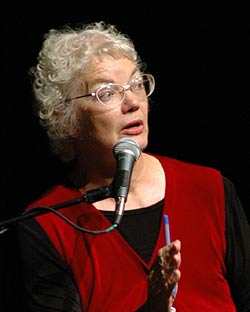Berkeleyan
Molly Ivins said that?
The liberal pundit, ‘serious as a stroke,’ holds forth at Zellerbach
![]()
| 14 October 2004
 Molly Ivins (Steve McConnell photo) |
Ivins, a syndicated political columnist and author of several best-sellers (including Who Let the Dogs In: Incredible Political Animals I Have Known and Bushwhacked: Life in George Bush’s America), spoke about Texas activists, corrupt politicians, and the necessity of guarding our civil liberties. She also launched several well-aimed zingers at President George W. Bush.
In her cross-country travels, Ivins delights in sharing heartening news with “discouraged liberals” who live in “red states” like Alabama. She speculated that her Berkeley audience might not need cheering up, then reconsidered when she thought about Arnold Schwarzenegger. The governor notwithstanding, Ivins suggested that Californians should be grateful they don’t live in Texas, where Gov. Rick Perry chose a former Enron executive to serve on the public utilities commission, then accepted a $25,000 check the following day from that company’s then-CEO, Ken Lay.
“Those with suspicious minds thought there might be a connection,” pronounced Ivins in her deadpan delivery. Even in Texas, where there are no sunshine laws (only, she says, “partly cloudy laws”), Perry was pressured to hold a press conference where he explained to his constituents’ satisfaction that the appointment and subsequent payment were “completely coincidental.”
Ivins gloried in the fact that three of House Majority Leader Tom DeLay’s (R-Texas) top five fundraisers were recently indicted for breaking Texas campaign-finance laws. “You have to understand the magnitude of that achievement,” she said. “We don’t have any campaign-finance laws. You really have to work hard to be indicted for that, so we’re real proud of them.”
Opening a window on other areas of the country, Ivins noted that in this “ugly political season … it’s getting harder and harder to have a civilized political conversation outside of Berkeley.” In Texas, she reported, “if you say that you’re not going to vote for Bush,” the standard response is “that you’re unpatriotic and don’t believe in God.” If any kind of conversation follows, “people get all red in the face and their tendons start to stand out in their necks, and their wattles commence to shake like a turkey gobbler. It’s just scary.”
In his introductory remarks, Chancellor Robert Birgeneau had asked Ivins to address whether U.S. citizens have more freedom to express their thoughts now than at the height of the Free Speech Movement 40 years ago. When the time came to address that question, Ivins said, “The pressure of conformity is lying heavier and heavier.” In times of war, “we always get a certain amount of patriotic bullying.” Those who support the war and the people who oppose it are polarized: The former group has “that kind of Merle Haggard, ‘Okie from Muskogee’ mentality” and considers the opposition “Godless communists.”
Scared so bad, it hurts
In addition to being alarmed by such political bullying, Ivins is also disturbed by her fellow Americans’ willingness to abdicate their civil liberties.
She recounted a story about her late friend, the celebrated Texas civil libertarian John Henry Falk, who, as a boy of six, went with his seven-year-old friend, Boots Cooper, to rid the family henhouse of a harmless chicken snake. From its high perch, the snake frightened the two boys, who fought each other in their hurry to exit the henhouse. When Falk’s mother reminded the boys that chicken snakes are not dangerous, Boots Cooper responded, “Yes, ma’am, but some things will scare you so bad, you’ll hurt yourself.”
“Don’t you know, that’s what we do again and again in this country,” said Ivins, pointing out that Americans willingly surrender civil liberties in an effort to quell their fears of such menaces as communism, crime, drugs, illegal aliens, and terrorists. “We think we can make ourselves safer by making ourselves less free. I’ll tell you something: When you make yourselves less free, all that happens afterwards is that you’re less free. You are not safer.”
Ivins also advised the left to be vigilant about another problem. “I am as serious as a stroke about this,” she said. “You people need to work harder at having fun. You are fun-challenged.”
Besides constituting a healthier approach to life, having fun, said Ivins, “will keep you from becoming disgusted, cynical, bitter, and burned out.” The humorist anticipated that any agitators in the audience might be contemplating deferring her prescription. “There is no use at all in thinking we’ll have fun after we win,” she cautioned. “As a Texas liberal I would like to explain to y’all, [that is] not a good plan.“
Ivins said she takes enouragement from the fact that “at least half of us have noticed this early” that the war in Iraq “is a disaster.” By contrast, she noted that it took many Americans 10 years to realize the Vietnam war was a mistake.
“The spin we’re getting from the White House — that everything is just lovely and that we’re going to bring a beacon of democracy to Iraq — is such happy horseshit,” said the partisan pundit. “I can barely stand to listen to it, and I spent years listening to the Texas legislature.”
Before Ivins’ lecture, the Mario Savio Young Activist Award was presented to Jason West, the mayor of New Paltz, N.Y., by Lynn Savio Hollander, widow of the Free Speech Movement leader. Since 1998, the board of the Mario Savio Memorial Lecture has recognized a young person (or group) deeply committed to human rights and social justice and who has demonstrated that commitment through effective action. The 27-year-old West founded the Generation Project to train future activists, performed marriages of same-sex couples earlier this year (before the New York State Supreme Court ordered him to cease and desist), and is a longtime environmental and labor activist. He received $4,000, half of which was earmarked for his nonprofit organization.

